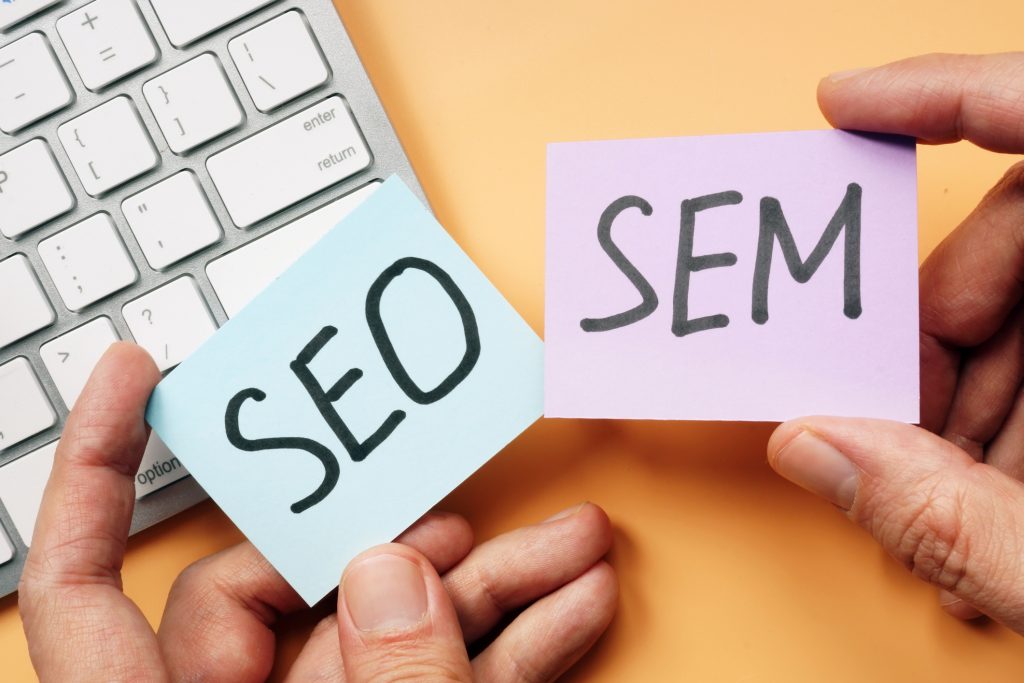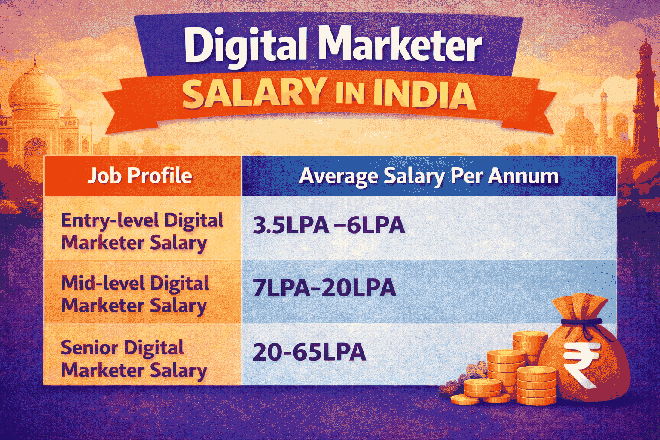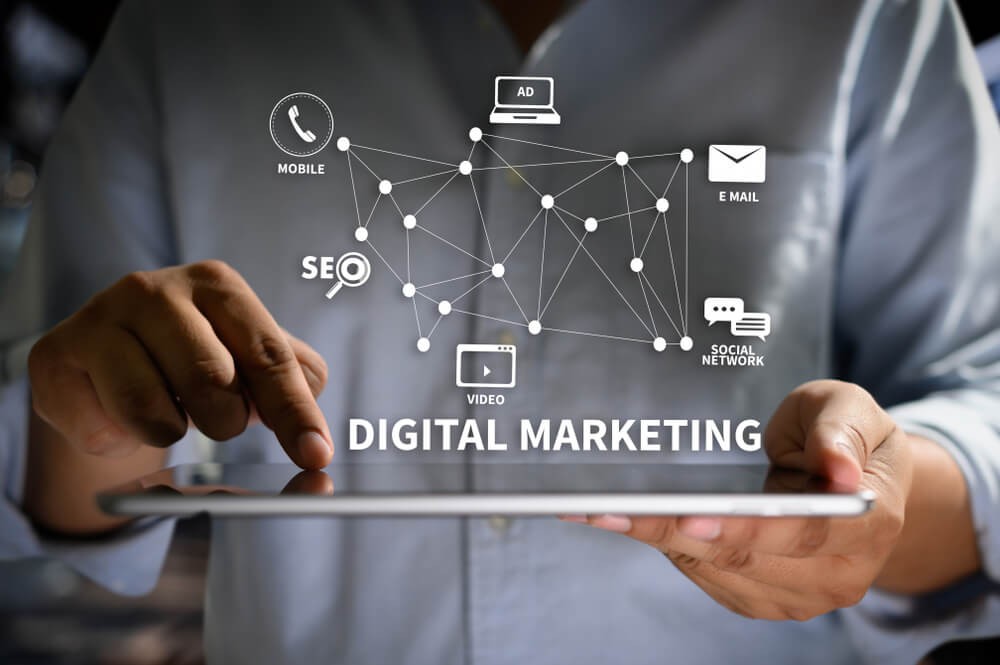SEO vs. SEM: Understanding the Key Differences in Digital Marketing
If you are trying to understand SEO Vs SEM and figure out which is the best way to move ahead, the first step is to deep dive into these concepts and get a hang of what might work out for you.
Search Engine Marketing (SEM) is a marketing technique that leverages various strategies, paid ads, and optimized content to boost a business’s visibility and enhance its brand awareness.
SEO or Search Engine Optimization is a strategy within SEM. While the latter includes both organic and paid searches, SEO only focuses on organic ways – using high-volume keywords, backlinks, citations, and convenient UI – to drive traffic and get higher ranks on the results page.
While SEO and SEM use different techniques and methods, they are essentially working toward the shared goal of connecting people with the right businesses, helping them both in the process.
This article will take you through different aspects of the two strategies, and help you assess SEO Vs SEM and decide when to go for which approach.
What Is SEO?
SEO, or Search Engine Optimization, is a way to increase your business’s online visibility, drive more traffic, and enhance your credibility. These, in turn, create a loyal consumer base and maximize your profits in the long run.
Businesses use a bunch of techniques to organically reach more people, connecting them with the information, products, and services they need –
On-Page and Off-Page SEO
Much like the name suggests, On-page SEO uses the components ‘on’ the website – content, ease of access, multi-device compatibility, and other technical elements – that help it rank higher on the results page. It makes the website more user-friendly and informative, driving both traffic and conversion rates.
Off-page SEO on the other hand consists of elements ‘outside’ the website that help it grow and reach more people. Backlinks, citations, social media and influencer marketing, and guest posts are common strategies businesses optimize.
Local SEO
This is used by businesses that have a physical store, outlet, or office they want their potential customers to visit.
Local SEO strategies include researching and including relevant area-specific keywords in their website content, creating and managing their Google Business Profile (GBP), optimizing Maps and online directories, and encouraging customers to leave online reviews.
Keywords
Keywords or ‘Search Queries’ are words and phrases that people put on search engines like Google when they are looking for a particular information, place, product, or service.
Say, you are looking for recipes for plum cake for a Christmas house party – you will probably search for something like “plum cake recipe”, “vegan plum cake recipes” or “1 Kg Plum cake recipe”. The search engine will display results from websites that have used these (or similar) keywords and are most likely to contain the information you want.
Seed Keywords are broad terms – words and phrases – representing the main idea or theme of your website or its content. For instance, in the cake example discussed above, a seed keyword could be “cake”, “cake recipes, or “plum cake”. All your other keywords within the content are going to be derived by expanding this core idea.
Primary Keywords or focus keywords are phrases that you’d want your content to rank for. These are more specific and targeted than seed keywords and are seamlessly included within the content. It describes the content’s focus. For instance, keywords like “how to make a 1kg plum cake”, and “vegan plum cake recipe” are primary keywords that
- People are likely to specifically search, and
- Convey exactly what the content is going to be about.
Secondary Keywords are phrases and sentences that don’t pinpoint the focus or core idea but are closely related to it. They add context and background to the primary keyword and expand on the topic, aiming to reach more people. Keywords like “dairy-free cake recipe”, “plant-based cake ideas”, or “cake to serve 10 people” are examples of secondary keywords that complement the aforementioned primary ones.
Semantic Keywords, also known as LSI (Latent Semantic Indexing) are terms or phrases that are “conceptually related” to the main keyword but aren’t necessarily synonymous to it.
In the cake example used above, a good LSI would be “ideal Christmas dessert”, or “perfect cake for small celebrations”. These will add depth to the content, present additional context, and emphasize the core idea.
Backlinks
Backlinks are links on other websites that lead back to relevant content/pages on yours. These allow the search engine algorithm to determine your page’s credibility and help it rank higher on the SERP.
What Is SEM?
It is important to understand the discussion around SEO Vs SEM to fully optimize the strategies and leverage the digital space to grow your business. While SEO and SEM share similar traits they are different from one another. In this section, let’s delve deeper into SEM so you can compare and contrast the two.
SEM is a popular strategy for digital advertising that allows businesses to rank higher on the SERPs. Credible content and paid searches help your website reach more potential consumers, expand customer bases, and improve brand awareness.
Businesses can buy ad spaces on results pages or websites to promote their content or organically improve their ranking by incorporating different SEO techniques.
Keyword Research
Before you incorporate relevant keywords into your content, you need to figure out what those keywords are. Keyword research is the process that lets you understand what your target audience is looking for, identify popular search queries on different search engines that are relevant to your themes, and optimize your website accordingly.
Prioritizing topics, using online tools to generate, research, and rank keywords, and ensuring you seamlessly integrate these phrases into the content, are ways you can get more people to visit your website.
Search Engine Optimization
Search Engine Optimization is a strategy within Search Engine Marketing. It focuses on using different methods – incorporating relevant keywords, leveraging backlinks, making websites user-friendly, and ensuring the information provided is factually correct and cohesively put together – to rank better. It helps brands and marketers reach more people, improve brand visibility and awareness, and increase traffic on the website.
Paid Searches and PPC
You know when you search for something on Google and the first few results are labeled as “ad” or “sponsored”?
Paid Search is a strategy in SEM where a brand or a marketer pays the search engine that displays their advertisements. These brands buy “higher ranking spots” on search engines like Google to boost their visibility and increase their traffic.
PPC or Pay-Per-Click is a type of paid search where the advertiser pays the search engine every time someone clicks it.
The pricing for these ads usually follows a fixed-price model (or flat-rate model) where the publisher has fixed prices for different spots or an auction-based model where advertisers bid for spots. The prices are heavily influenced by the search volumes and competition for the targeted keywords and varies from one industry to another.
Key Differences Between SEO And SEM
Here’s a quick analysis to understand the key points in SEO Vs SEM, and choose what strategy might work best for your business –
- Time – SEO focuses on organically boosting traffic, which might require trial and error, and a longer period to rank well, as opposed to SEM which allows the marketer to optimize paid spots and boost visibility sooner.
- Cost – SEM includes paid ads and PPC that strategically utilizes the best spots on SERPs. This makes it more expensive than SEO which relies on free clicks and organic content optimization.
- Conversion rate – While it varies depending on the sector, keyword competition, and other factors, SEO is known to have better click-through rates and conversion rates, often attributed to its organic, original, and more relevant content.
- Performance – SEM is considerably easier to test given its quick and efficient results, however, SEO can take time – even a good few months – to organically grow. Although they both have their own benefits, there’s no unit of measurement for their performance.
If you want quick results, SEM might be your path, but, if you can’t invest in paid searches, SEO can be super useful too. Many businesses choose a blend of strategies where they use both paid and organic searches to maximize their visibility and reach as many potential consumers as possible.
Conclusion
You can be a small-business owner, an aspiring digital marketer or copywriter/content writer, or simply someone who wants to get to know the digital space better; SEO and SEM drive the online space, and acquainting better with it can open up a whole new world of possibilities and opportunities for you.
SEM uses techniques like SEO, paid searches, and PPC to boost a brand’s visibility while SEO uses targeted keywords, backlinks, friendly interface, and off-page elements to organically drive more traffic. Although they share the same goal, the key difference lies in how much time they take, their cost, and how good the results are.
If you are working on a budget, SEO can offer a long-term growth model where you get to reach out to loyal consumers as you build the brand. However, if you want to run quick campaigns for immediate results, SEM might be the right path for you.
To learn and understand more about SEO Vs SEM and keep up with trends and innovations in online advertising, check out the digital marketing courses offered by AAFT.











